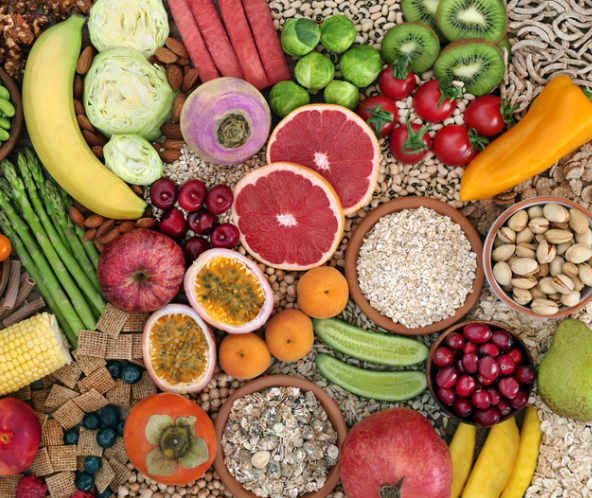Nourishing Your Gut Microbiome with Food
March 14, 2024
 The gut microbiome, which is the habitat of various microorganisms that live in our digestive tract, plays an integral role in our overall health and well-being, influencing everything from our digestion and metabolism to our immune function.
The gut microbiome, which is the habitat of various microorganisms that live in our digestive tract, plays an integral role in our overall health and well-being, influencing everything from our digestion and metabolism to our immune function.
We can support our gut microbiome through incorporating a variety of foods that foster a diverse and thriving community of microorganisms. The gut is incredibly resilient, and we can see changes in our microbiome in as little as 24 hours after making major dietary shifts! In this blog, we’ll explore how you can nourish your gut through a diet that promotes balance and variety.
- Fiber:
Incorporating a variety of fiber-rich foods into your diet is a great way to support your gut microbiome. Whole grains, fruits, vegetables, and legumes are excellent sources of fiber that promote the growth of beneficial bacteria. Aim for a colorful plate – different fibers feed different microbes and increase diversity within the gut.
- Probiotics:
Probiotics are live bacteria that provide numerous health benefits, especially for the gut. Try incorporating fermented foods such as yogurt, kefir, sauerkraut, kimchi, and miso in your diet. These foods introduce beneficial bacteria into the gut, helping to maintain a healthy microbial balance.
- Prebiotics:
Prebiotics are non-digestible fibers that serve as food for the beneficial bacteria in your gut. Foods rich in prebiotics include garlic, onions, leeks, bananas, asparagus, and chicory root. Including these in your meals can help nourish and support the growth of beneficial gut bacteria.
- Omega-3 Fatty Acids:
Omega-3 fatty acids are found in fatty fish such as salmon, mackerel and herring, as well as in flaxseeds, chia seeds, and walnuts. They have anti-inflammatory properties that can positively impact the health of the gut microbiome.
- Mindful Eating:
Adopting mindful eating practices can contribute to gut health by promoting digestion and absorption of nutrients. Try taking a few breaths before eating, chew your food more slowly and try to savour each bite. By tuning into your body’s hunger and fullness cues and reducing stress during meals, we can optimize our gut-brain connection and the benefits we get from our nourishing foods.
Cultivating a healthy gut involves incorporating a variety of nutrient-rich choices that promote a diverse and balanced microbiome. By incorporating a variety of colorful, fiber-rich foods, embracing fermented foods, and paying attention to your body’s cues, you can take meaningful steps towards supporting your gut health….and your overall health. We have many supportive gut health recipes on our website. If you are interested in more information, feel free to check out our nutrition workshops or meet with one of our dietitians!
Please note that these are general recommendations and may not be appropriate for you. Please talk to a healthcare provider for personalized support.
References:
- Yoo JY, Groer M, Dutra SVO, Sarkar A, McSkimming DI. Gut Microbiota and Immune System Interactions. Microorganisms. 2020; 8(10):1587. https://doi.org/10.3390/microorganisms8101587
- Pradipta Banerjee, Krishnendu Adhikary, Aritra Chatterjee, Riya Sarkar, Debasis Bagchi, Nandini Ghosh, Amitava Das. Chapter 9 – Digestion and gut microbiome, Editor(s): Debasis Bagchi, Sunny E. Ohia, Nutrition and Functional Foods in Boosting Digestion, Metabolism and Immune Health, Academic Press (2022), Pages 123-140, https://doi.org/10.1016/B978-0-12-821232-5.00029-X
- Singh RK, Chang HW, Yan D, Lee KM, Ucmak D, Wong K, Abrouk M, Farahnik B, Nakamura M, Zhu TH, Bhutani T, Liao W. Influence of diet on the gut microbiome and implications for human health. J Transl Med. 2017 Apr 8;15(1):73. doi: 10.1186/s12967-017-1175-y. PMID: 28388917; PMCID: PMC5385025.